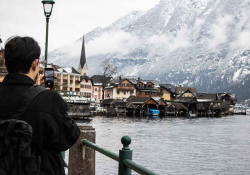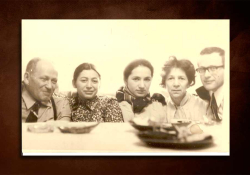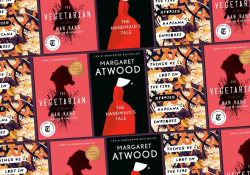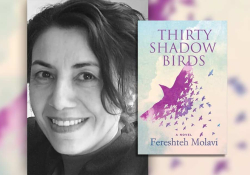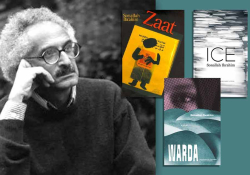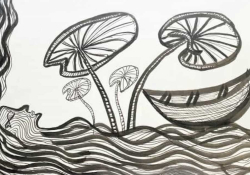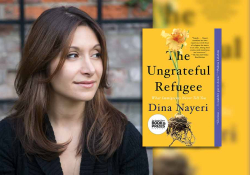Self-Portrait of the Other: Translating for a Globalised World
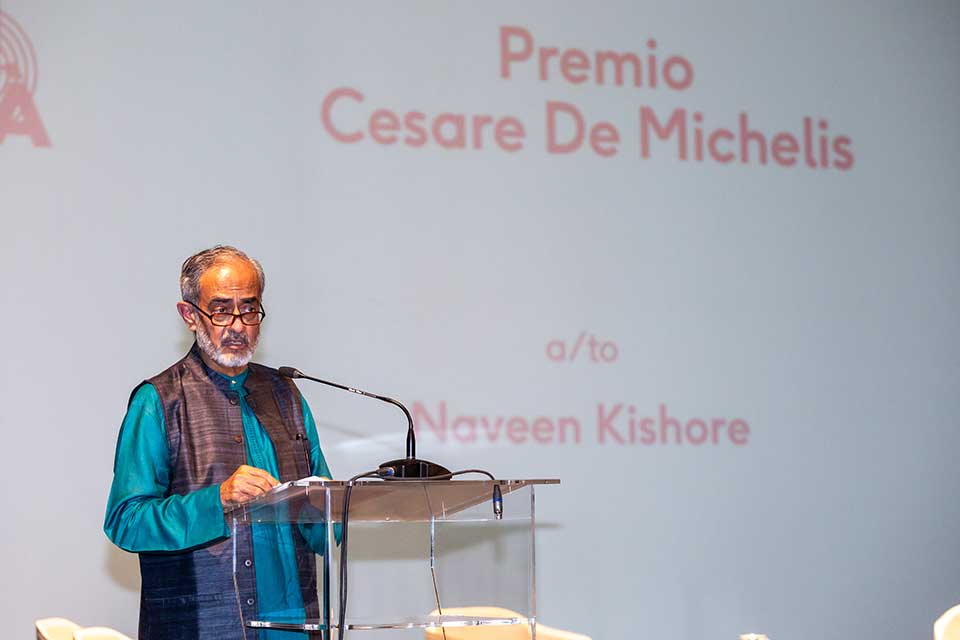
Naveen Kishore, publisher of Seagull Books, became the first recipient of the Cesare De Michelis Prize, awarded by independent Venetian publisher Marsilio Editori—in conjunction with the Ca’ Foscari University of Venice—to a publisher who has distinguished him- or herself internationally through the development of outstanding publishing projects. Kishore delivered the following acceptance speech on May 25, 2022, at Venice’s Goldoni Theatre during the Incroci di civilità (Crossing of Civilisations) literary festival.
Unable to reach the bottle of ink on the writing table, I climbed up on the chair, pushing the leather-bound bricks on the table to one side. Having made room for myself, I took the red notebook and went through it page by neatly filled page till I came to a clean white sheet. Took the glass bottle with the blue ink. Took out the conical stopper. Looked around the desktop and found the long-nibbed writing instrument I had seen my father use. Dipped it in the ink. Began to doodle on the sheet. In deep concentration. Tongue between my teeth. Elbows on the desk. My knees rubbing the rosewood top. Unable to decipher. Making my own sense of the language that had not yet begun to reveal itself to me. I laboured hard at filling the page. Like I had seen him do. My father. Page after page. In my excitement the hand I was using to write knocked over the ink bottle. Onto the page. Unable to stop the inkflow I watched it bleed endlessly onto the pages. Like a tidal wave it soon swept all over my painstakingly written scratched-doodled sandcastle drowning in its wake. Devouring the white. Blue-fanged monster. I began to cry. Copiously. In confusion. And in hurt. My tears a river. Chasing the ink. Smudging. Chiding. Fighting its devastation with clenched fists.
Then, as I watched, the advancing ink came to a halt close to the edge of the page. It reared back, arched itself into a curve, revealed its coral-green underbelly, turned on its heels, and began to call back its forces. Gathered them into a swirling cloud that bored a hole into the centre of the page. An army in blue deciding to drown in its own swell. Till all that remained was an even, round circle. A blue lake. Calm. Serene. Contrite.
The tears of a four-year-old had washed the page clean.
Twenty minutes.
“How do you create so much emptiness?” they asked him.
“It isn’t empty, really. Is it? I mean there’s the light . . . the stillness takes up space . . .”
Question to self: Of what is the stage experience made?
An iconography of impressions,
of influences,
of readings and viewings,
of drunkenesses and wantonesses,
of illnesses borne impatiently,
of hurting,
of simply waiting for hours on end,
of learning to string green peas with a fork and knife,
of stealing ideas, and cheating by turning pictures upside down and reproducing them as “fresh” designs,
of hero-worshipping,
of lusting,
of restlessness and frustration,
of poverty,
of missing opportunities and reaching for them when least expected,
of inabilities,
of struggling in a body that senses movement but cannot replicate it,
of bearing crosses,
of shynesses and their opposites,
of learning to beg for favours,
of living with mud-spattered faces,
of buried pride and countless funerals,
of trepidation,
of houses that sold out and those that had smaller audiences,
of failed cues and “moments of magic,”
of caring,
of detail,
of ingenuity,
of sensing that “A” ladders are not just for climbing,
of throwing caution to the winds,
of risks taken and toes stubbed,
of slippery slopes and replays,
of counselling sessions,
of loving women and men,
of being moved over issues that seem lost,
of politics and hours spent on railway stations,
of art, and music, and cinema,
of tears that come easily and those that have to be squeezed out of over-wrought eyes,
of fabric, and wood, and metal, and paint, and paper, and grease, and the never-ending desire to make what-is-not look like what-is . . .
Question to self: Why is memory so often sensual? What does memory have to do with designing stages? Or books? Or catalogues?
What does memory have to do with designing stages? Or books? Or catalogues?
Everything.
December 6, 1992
It is the hour after the demolition of the Babri Mosque. I am to design another stage for an Indian music concert featuring Hari Prasad Chaurasia on the flute and Zakir Hussain on the tabla. I have been designing stages for the last fifteen years using whatever material I can lay my hands on: found objects and ephemeral smoke effects will no longer do.
I have just heard that after the Babri demolition some people rushed into the train from Pune to Bombay, screaming, wanting to cut off Zakir’s hands.
How does one translate this helplessness into a stage design that will be both a tribute to a great musician and an expression of this impossible day?
I reach for an aluminum “A” ladder lying in the theatre. I reach for another. One taller than the other. I place them diagonally across the back of the 16 x 8 foot platform covered in black velvet, which is in turn placed square on a matte black floorcloth that shrouds the entire stage floor. I then proceed to insert wooden battens like giant spikes between the different rungs. I then rip open reams and reams of blood-red cloth. Then suspend one end from the black flies above the ladders. The other end ties the ladders into knots and spills over onto the black velvet. Makes its way across the black of the floorcloth. There is no stopping the blood now. It flows free and uncontrolled. Like an artery that has been slit. It covers the seats bisecting the hall diagonally and makes its way to the foyer and up the stairs and onto the street. I create another fissure across the other side, also diagonally bisecting the first one. Like a giant “cross” of red. This too finds its way to the street from the other entrance.
The audience must sit on the bloodied seats.
Fall 2017
The Loss Catalogue
Khadi. Handspun fabric. In twenty-one variations and as many colours. Clothbound wonder. The edges of the “object” gilded in gold. The “gilding” accidentally responsible for the sighing of the pages each time you turn them. Like they have been visited by the memory of a loss. From a past long buried. A sound that the heart must surely make when being torn from one’s beloved. A marriage of intent and chance? An intuitive design tool? Perhaps both. And the paper. Natural Evolution with specially designed textures scanned and printed on the white. Reminding one of paper that the fire singed but didn’t succeed in burning. Resilience and an urge to survive. Like the books we make. And the way we make them. The catalogues of our books. Not just books. Our passions. That shepherding of a certain kind of literature and thought and philosophy and politics and performance and poetry and drama and film that make up our lives as publishers. A catalogue that has to convey all of the above to its new acquaintances as they leaf through it. And the texts within. The ones that have been specially written by authors and translators and booksellers and publishers. A catalogue that happens once a year and is new each year. Thematic. Like this one. Where the theme is Loss. Of all kinds. From relationships to professions. Even the loss of life itself. A catalogue that allows you to find new meaning with every dipping. A catalogue that slips into your consciousness. One that gives you an image of the publisher’s intent without the rhetoric of an accompanying explanation. The object is the thing. There is nothing to guide you except the clues that the design offers. The way images are created. From photographs culled from personal archives. Yours and mine. Sepias that remind one of brittle flower petals in old books. Worked upon by the artist and rendered into collages that move in and out of the text. Interpreting. Blending. Leading the reader to newer discoveries. It isn’t about the content alone but also about the tactility of the design. Its relationship with the books themselves. The ones the catalogue proudly showcases.
A celebration of the senses.
I am a publisher. One who has learnt to “disrespect” the notion of boundaries as we know them. Not out of a sense of arrogance. Or “I know better.” No. Out of reasons that are political. As most things these days need to be. And, yes, cultural. Always cultural our “baggage”! Boundaries. Man-created. Boundaries. Nation-made. But culture travels. Translates. Therefore we transgress. Not just boundaries but also imagination. We subvert existing frameworks by suggesting different ones. A new way of being a community.
Culture travels. Translates. Therefore we transgress.
They set up nation-states that ghettoize the book. Make it a commodity. To be hounded. Chased to the ground. Bought and sold across territories. Across languages. Like literary slaves.
I guess what I am attempting to express is that in this, our world of publishing, too much time, energy, money is spent on creating structures that ultimately box us in.
Books are crisscrossing continents, languages, and territories, flying with ease through the universe of ideas. I cannot repeat this enough: in a globalised world, your geographical location is redundant.
As long as your money is as good as everyone else’s and you produce books to exacting standards and have a reasonably efficient distribution system, you should be able to publish from anywhere. This is a practice of borderlessness in a world that likes to build walls.
I am often asked about “sustainability,” about “structure,” about “vision” and the “ability to reinvent.” I never have convincing answers. I have no scientific or rational methods of arriving at “things”; I live hand in hand, or hand in glove, with the “uncertain” and the “intangible.” The opposites of structure. I am aware that I also live in a time that does not lend credence to that feeling at the pit of your stomach, that “gut feeling.” Particularly not in business or politics. In fact, it is fast-fading even in the arts.
Underlying all this is an urge to survive and to do things. Specifically, “things in the arts.” And this is precisely what independent publishers have been doing for so many decades. “Survival” carries with it a sense of the precarious. This is true, but it need not necessarily make for a strained, unhappy look! As long as you manage to take care of your daily necessities—you can produce a certain kind of book that few wish to buy; you can make it possible for an experimental performance to take place; you can exhibit an artist’s work that no one else wished to present.
Just begin. It will happen.
How do I explain a lifetime of surviving in the arts on instinct? There are no strategies except those that come with hindsight. Retrospective logic. Method that unveils itself after you have said yes to books that you perhaps liked only because of their title. Or the instinct that taught you to read the 150-word gist from French–German–Italian publishers while you swiftly made a choice. This one will work for me. Maybe. Or perhaps you trusted a growing group of translators with exciting wish lists. And yes, also publishers who came to you with their own instinct about what they want to offer you.
Our choices are to do mostly with freedom, on one hand, and the human condition on the other.
We publish what we want to publish. What we want to publish is what we find meaningful. Often this appears to be out of sync with trends around us. Our choices are to do mostly with freedom, on one hand, and the human condition on the other. Everything that rings a bell under these headings is worth considering. Across cultures. Across languages. Borders. Ideologies. The unknown author gets as much space on the shelf as the known one. We see ourselves as a part of a world community. So we openly share ideas, connections, thoughts, resources with other publishers. Principles that respect translators and authors with equal courtesy.
Ours is a practice that will always remain fragile. Our openness to ideas makes us receptive to all that is new and untried. Especially in these times when culture is slowly but surely being hijacked by forces that are anything but benign. I feel watched in a way I never have before. And I am afraid that a technology that I do not understand is both spying on me and entertaining me. I am under surveillance even as I am seduced by it. The all-pervasive “They” of our lives. The “They” as State. As a state of mind. As a powerful presence that will have its way. “They” as Corporation. “They” as newspapers. As television. As theatre and cinema. “They” as Media with a capital “M.” “They” as power that knows no boundaries. “They” without conscience. Yes. It is like listening to music that is both hypnotic and evil. That attracts. That refuses to let go of my attention.
I listen to the songs but do not understand the words.
The space for our songs is not as free as it used to be.
Question to self: What were the core beliefs that you would not compromise?
To be honest. Ethically in tune with my self. To remain working and with the arts. To not fall into the trap of creating commerce only—but commerce also. To be different from the mainstream—not out of arrogance, but because all of that is already being done. To up the ante always—whether by choice or by accident. That word—accident. To remain open to them, to chance, to fate, to good old-fashioned luck. To keep a seat empty at the table for the unexpected but always welcome guest. To be independent, in thought and deed. To embolden others to be the same. To practice what I preach. To put my money where my mouth is. To recognize and reward initiative with responsibility and freedom. To not be swayed by accolades. To persist persist persist, especially on the darkest of days. To be creative with whatever resources are at hand. To recognize that there are always resources at hand—minds, ideas, connections, people, money.
The core belief is this: that the personal and the political are the same. All our work must arise from this. And we must at all costs fight for independence, whether that concern artistic expression, literary thought, or a way of earning our livelihood.
I can’t repeat this enough. It isn’t about size. Or scale. It is about making the choice that allows you to risk stepping outside the structures so “magnificently” set up by the world of corporate publishing. To publish books that in our opinion need to exist. To find readers who must exist.
Target audiences are a myth. No one can know for certain what people will read. It is always after the “event” of the book being bought and read that you grow wise to the fact. Not before. And often corporate wisdom can make you slip into what can sympathetically be called the mainstream. That which others before you have done. With apparent success. Success that they can replicate, book after book. At will. With figures to back them up. The familiar formulae of success. If you do this and this and this and this—you will have a bestseller. So do it. Multiply your profits. Perfectly acceptable.
Often the same wisdom winks back at you and asks, “What if you throw me out of the window and let your good sense prevail?” That gut feeling. Let it rise and envelop you. Do the thing you want. Not a question of the right thing. Or its opposite—the wrong thing. Just the thing that must be done. Because. Well—because someone should, so it may as well be you. The independent publisher.
Seagull thrives on relationships. With authors. With other publishers and the entire bookreading bookmaking bookselling community. With cultures as wide apart as your average ocean. With readers equally widespread. And invisible. Till they chose to show themselves. But to make them appear, you need to make books they can relate to. Books that you have nurtured into reality. Books that you have bet your life on. Not once. But each time you publish. You know the phrase “going out on a limb”? Well, if you want to be independent, then you’d better get used to walking on that limb.
Question to self: What in your opinion is an honest piece of writing?
One that has retrospective magic. Born out of intuition at the time of writing. One that plays hide-and-seek with both the rationale and its aftermath. A practice that is an acknowledgement of the fear of the unknown as it unfolds word after word and begins to arouse your senses as you write. The muse is active only when you allow yourself to write wearing a blindfold over a pair of tightly shut eyes and your hands bound behind your back so that you cannot loosen the knot either out of impulse or deliberate intent in order to cheat your muse. The muse is best served and in turn best serves you if it remains invisible and faceless.
Honesty implies vulnerability. Will the words I knit make sense? Resonate with the reader? It doesn’t matter how harsh the truth is. But if it is to work the writing must slip past the readers’ defences. Their armour of rehearsed responses. Your vulnerable self, made visible, through their reading.
April 12, 2020
I read an entire book in an afternoon. I can sense the author is persuading me to step into the life of the characters. It is good literature. It draws me in. But a part of me is wary. I recognize the trap. And the lure of the words. I surrender to them as a sympathetic reader. I want the words to work. The words in turn try their hardest to work. But somewhere there is an underlying absence of truth. Learning to write well when you have something to say may be possible. But what to say and how to say it without recourse to conscious artifice are things the writer needs to strive towards. I’m not sure anything other than the intuitive can achieve this.
Question to self: What does it take to be a good human in these times?
Dark times. But you already know this. What is important is to teach our young. The possibility of resistance. The constant need to be vigilant aware involved active. The activity that translates a creative impulse into activism. Translation as a need. Need to right that which is wrong. Writing wrong—describing through your writing the ills, the injustices that remain hidden in the midst of a dailyness that is so taken for granted as a way of life, as in, “this is the way things are, have been, will be, nothing to be done.” So: translating these stories into existence. Translation as midwifery, then? Perhaps. Challenge the language you have so carefully cultivated. Revisit the meaning of words you have, since childhood, imbibed as universal truths. Consider the act of translation as impulse, as motivation, as a “telling” of that which would otherwise remain “untold.” So: speaking out and speaking about the forbidden? Maybe. Smash the frames that rule the act of translating from one language into another. Translation as action. As activism. Craft made passion. What matters is to subvert the status quo. Translation as subversion. Translation as a literary act. Translation as a political act. Translation as cinema. Translation as theatre.
Resistance as a way. Of life. Ways also of living a life that is not without hope. Therefore, a life. Of hope. A life that suggests the possibility of goodness. Like everything else, “goodness” is a practice. You have to learn the skill. Study its variations. Practice. Hour after hour. For days at a stretch. For a lifetime. Translation as resistance.
Publishers resist. Period.
Publishers resist. Period.
Angry times, these. Times that tend to push you to the edge of rage. A little provocation. A nudge in the wrong direction. Enough to plunge you into an unforgivable moment of anger. The abyss that offers no return. We are taught to believe that being desperately angry is not the solution. Yet how many times a day do we teeter on the brink? Like angels struggling before the fall. Wings tied. Feet and legs bound together. Afraid of the unknown. The fall over the rim is into limbo.
Falling Falling Falling.
December 15, 2021
Even as the first snow began to fall.
I looked over my shoulder to see the footsteps I had left behind. They followed me. Like shadows that refuse to let go. Changing shape. And sizes. Reversing direction. Becoming shorter or longer. Often disappearing completely. Then reappearing. Clutching my arms and feet and shoulders and often reaching for my face or the back of my head. Dodging. Skipping. Hopping. Lying low and pouncing. Breathless. I look again and see the little snow flurries blowing away the marks left behind. By my retreating feet. Leaving no trace behind.
As if no one had walked this way before.
No one but the winter wind.
May 25, 2022
Venice

